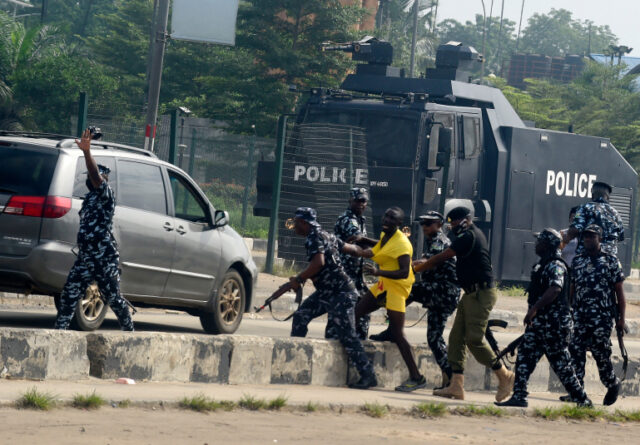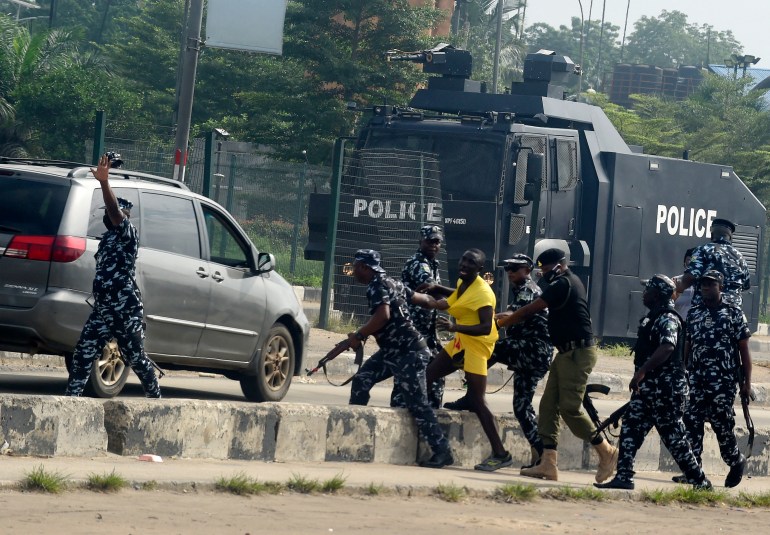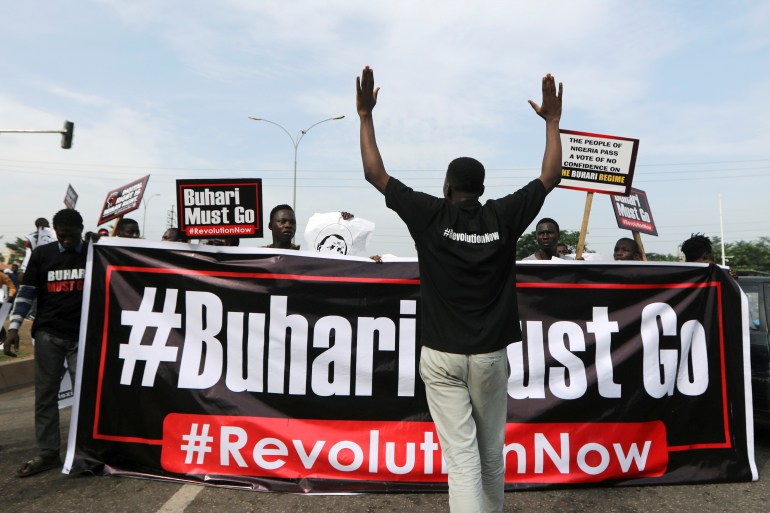

Nigerian police have fired tear gas to disperse anti-government protesters in Lagos and the capital, Abuja, with reports of arrests and injuries.
Activists had called for nationwide protests on Saturday on Democracy Day, which marks Nigeria’s move to civilian rule more than 20 years ago, over what they criticise as bad governance and insecurity, as well as the recent Twitter ban by the government of President Muhammadu Buhari.
There were also pockets of protests in Ibadan, Osogbo, Abeokuta and Akure, all in southwestern Nigeria.
The protests were the first to take place simultaneously in several cities since the #EndSARS movement against police brutality in October grew into the largest anti-government rallies in Nigeria’s modern history.
Hundreds of protesters gatheredin Lagos, a sprawling megalopolis of more than 20 million people, and police fired tear gas to disperse the crowd. The protesters carried banners and placards saying “Buhari Must Go”, calling for reforms.
Al Jazeera’s Ahmed Idris, reporting from Lagos, said the protest march in Lagos “started peacefully and in an organised fashion, with demonstrators chanting pro-democracy songs”.
“The police were deployed in large numbers here in Lagos and in other parts of Nigeria in anticipation of trouble on this day,” he added. “When the demonstrators breached the first line of defence of the police, the second and the third, the police started firing tear gas at them and journalists at the scene. Later, there were live rounds fired in the air.”
 Anti-riot policemen detain a protester during a demonstration at Ojota in Lagos [Pius Utomi Ekpei/AFP]
Anti-riot policemen detain a protester during a demonstration at Ojota in Lagos [Pius Utomi Ekpei/AFP]In Abuja, a similar scenario played out as the protesters gathered as early as 7am (06:00 GMT).
A detachment of police and army broke up the crowd using tear gas, AFP news agency reporters at the scene said, adding that some journalists were harassed by the security forces.
Police had said the protests were unauthorised and AFP reporters said they saw several people being detained.
“We cannot continue like this … all the bad governance must stop,” said protester Samson Okafor in Lagos, where tear gas canisters smouldered in the street as police shouted at demonstrators to leave the scene.
Officers were also seen smashing mobile phones confiscated from protesters, some of whom criticised the government’s decision to suspend access to Twitter after the social media platform removed a post by Buhari.
 Protesters carry placards and banners during a June 12 Democracy Day rally in Abuja [Afolabi Sotunde/Reuters]
Protesters carry placards and banners during a June 12 Democracy Day rally in Abuja [Afolabi Sotunde/Reuters]Buhari, a former general first elected as president in 2015, has been under pressure over growing insecurity in Africa’s most populous nation, home to more than 200 million people.
Security forces are battling an armed uprising in the northeast, a surge in mass kidnappings and attacks by criminal gangs in the northwest, and a rise in separatist tensions in the southeast.
The government also triggered an outcry a week ago when it indefinitely suspended Twitter in the country, saying the platform was used for activities aiming to destabilise Nigeria.
Saturday’s demonstrations were called to coincide with “Democracy Day”, marking the anniversary of Moshood Kashimawo Abiola’s election as Nigerian president in 1993.
Abiola’s victory was annulled by the then military government, plunging Nigeria into months of civil unrest.
Nigeria returned to civilian rule in May 1999, but Buhari chose June 12 as Democracy Day after becoming president to honour Abiola and other heroes of the struggle.






